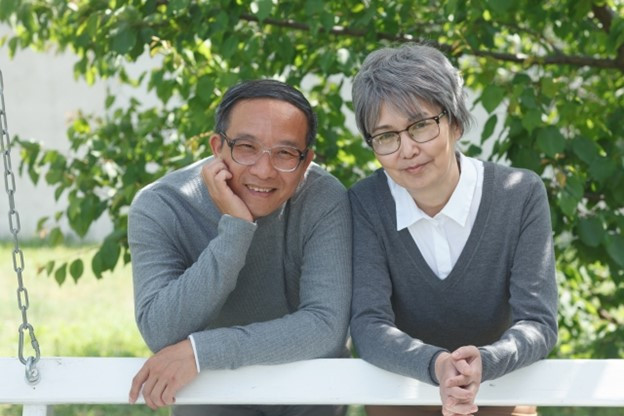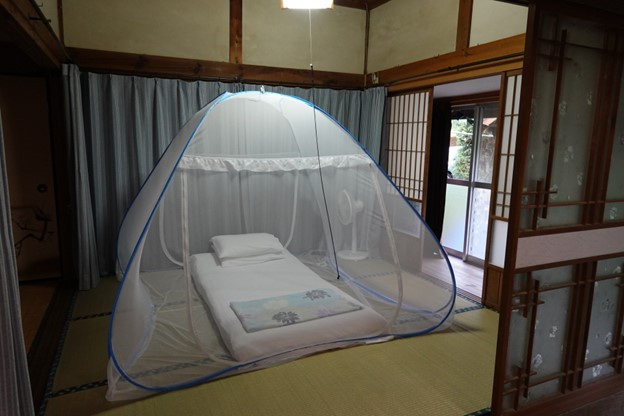Staying with a Japanese Family during your study abroad program or travels in Japan offers a unique and enriching cultural immersion. It’s a chance to experience Japanese daily life firsthand and share your own culture in return. However, it’s important to consider if a homestay is the right choice for you. Having lived with host families myself, including in Japan, I’ve learned that asking yourself a couple of key questions beforehand can make all the difference. I’ll also share essential tips to ensure a positive japanese family homestay experience and guide you on where to find the perfect host.
Question #1: What Are Your Expectations for Your Japanese Family Homestay?
 An elderly Japanese couple is smiling at the camera. They both wear glasses and a grey sweaters. They are in a garden, green tree branches behind them. They are leaning on a white barrier.
An elderly Japanese couple is smiling at the camera. They both wear glasses and a grey sweaters. They are in a garden, green tree branches behind them. They are leaning on a white barrier.
Many people are drawn to japanese family homestays for various reasons. Perhaps you are eager to learn about the nuances of japanese family life, improve your Japanese language skills through daily conversation, or simply desire a built-in support system and social network upon arriving in Japan. These are all valid motivations.
However, it’s crucial to remember that your host family also has their own motivations for opening their home to you. Ideally, your objectives and theirs will align for a harmonious experience. Some japanese families may be interested in cultural exchange, wanting to learn about different cultures without the expense or time commitment of travel. Hosting a student can be a way to fulfill this interest.
Potential conflicts can arise when expectations diverge. In my own experience during a year studying abroad in Nagoya, my primary goal was language immersion and cultural understanding. However, my host family viewed my role differently – as an informal English tutor for their daughter. They were disappointed when I spoke Japanese with her and showed little interest in learning about my culture. This mismatch in expectations led to a less than ideal homestay experience. (It’s worth noting that I have also had very positive homestay experiences and know many others who have thrived in japanese family environments, so this shouldn’t deter you entirely!)
Another possible scenario involves families who host primarily for financial reasons, renting out a spare room for extra income. In such cases, you might be treated more as a lodger than an integrated family member. This could be a conflict if your aim is deep cultural immersion within a japanese family. Conversely, this type of arrangement might offer more independence and relaxed house rules, which some students might prefer. Understanding your own priorities and considering potential host family motivations is key to a successful japanese family homestay.
Question #2: How Adaptable Are You to a Japanese Household Environment?
 A traditional Japanese room with tatami floors and paper partitions. A mosquito net is set above a single person futon on the floor.
A traditional Japanese room with tatami floors and paper partitions. A mosquito net is set above a single person futon on the floor.
Living in a japanese family home will undoubtedly present differences compared to your own household. While variations exist between individual families, certain cultural norms are common. For instance, removing shoes at the genkan (entrance area) is standard practice in most Japanese homes. However, even within this custom, there can be subtle differences in household rules, such as whether your feet are allowed to touch the genkan floor itself.
Personal habits may also need adjustment. If you prefer morning showers, you might need to shift your routine. Japanese families typically bathe or shower in the evening before relaxing, and morning washing is sometimes viewed as unhygienic in relation to bed linens. Conversely, I once received a surprising reprimand from my host family for using soap when washing my hands after using the restroom! This highlighted a different perspective on handwashing practices, as soap use in public restrooms, particularly pre-COVID, was not always common in Japan.
The physical environment can also be different. You might find yourself in a traditional Japanese house, a modern apartment, or something in between. Sleeping arrangements can vary from Western-style beds to futons laid out on tatami mats. These differences can be seen as either positive or negative, depending on your preferences. Embracing these variations is part of the japanese family homestay adventure.
Household rules will also be family-specific. Some japanese families may have curfews, while others grant you more autonomy with a house key. Chores within japanese families can also differ; while some expect shared responsibility, others, particularly in households with stay-at-home mothers, may handle most household tasks themselves. Clarifying expectations regarding chores, curfews, and other house rules upfront will contribute to a smoother japanese family homestay experience.
Tip #1: Prioritize Open and Honest Communication
 A young Japanese woman and a young Japanese man dressed in casual clothes are sitting on a blue sofa. They both hold coffee cups and seem to be chatting happily.
A young Japanese woman and a young Japanese man dressed in casual clothes are sitting on a blue sofa. They both hold coffee cups and seem to be chatting happily.
Once you’ve decided a japanese family homestay is for you, how do you ensure a positive experience? The answer is simple: communication! Effective communication is crucial for both you and your host family. Moving into a new household can be initially intimidating. Clearly articulating your goals for your time in Japan and inquiring about your host family’s expectations for hosting can be incredibly helpful. It’s even beneficial to have house rules and expectations written down to refer back to, especially as initial orientations can be overwhelming. Open and honest communication, while sometimes challenging with new people, is fundamental to building a strong and positive relationship with your japanese family.
Tip #2: Embrace Mistakes as Learning Opportunities
 A close-up of a calico cat that is grooming. It as its paw on its head, which makes it look like it is ashamed.
A close-up of a calico cat that is grooming. It as its paw on its head, which makes it look like it is ashamed.
The prospect of living with a japanese family might seem a bit daunting, and it’s true that there will be adjustments. But remember, this is all part of the learning journey! You will inevitably make cultural or linguistic missteps, and that’s perfectly okay – it’s why you’re there! For example, I once threw away grapes that had a bit of mold, thinking I was being helpful. However, my host family explained that these were expensive gift grapes, meant to be washed and eaten for dessert. This firsthand experience taught me about the different value placed on fruit in Japan compared to my home country. Mistakes are valuable learning tools. The key is to learn from them and embrace the cultural exchange process.
Finding Your Japanese Family: Homestay Resources
 A blond Japanese woman and a caucasian man are sitting at a kitchen table, in front of cups of coffee. The woman is holding a smartphone and the man is using a tablet. They seem to be talking using these tools as a help for communication.
A blond Japanese woman and a caucasian man are sitting at a kitchen table, in front of cups of coffee. The woman is holding a smartphone and the man is using a tablet. They seem to be talking using these tools as a help for communication.
If you’re enthusiastic about experiencing a japanese family homestay, several avenues can help you find the right match. If you’re an exchange or international student, your educational institution may have a dedicated homestay program. Websites like Homestay.com and Homestay in Japan specialize in connecting students with host families. Platforms like Couchsurfing or AirBnB can also offer homestay options, though it’s crucial to verify host vetting and reviews on any platform you choose. If you are ready to embark on a japanese family homestay, I hope you have an unforgettable and enriching experience!

